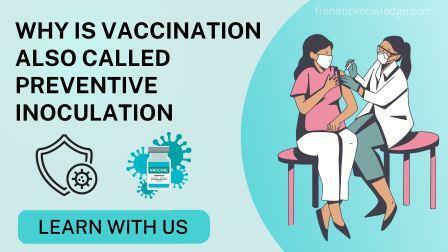Q- why is vaccination also called preventive inoculation
Answer- Vaccination helps in generating antibodies in an organism’s body to defend against foreign microbes or diseases. That is why vaccination is called preventive inoculation.
After reading the above answer, we are damn sure that now you understood ‘why is vaccination also called preventive inoculation’.
In case you want to know some other main reasons why is vaccination also called preventive inoculation? Then you should read the content given below. In the below paragraphs, we are going to tell you about the definition of vaccination and the reason why is vaccination also called preventive inoculation.
Before getting started with all of the educational stuff we would like to suggest to you some of our other posts read.
Vaccination
Vaccination refers to the process of injecting a vaccine into an organism’s body. This is done to generate antibodies inside the organism’s body that will help in defending against the microbes of any specific disease.
A Vaccine is a specific medicine that was made differently for the treatment of different diseases. So, this vaccine works as an antigen that stimulates the formation of antibodies inside the body of an organism.
Overall vaccination help in increasing immunity inside the body. The process of making the immune system stronger is called immunization.

If you do not know the difference between immunization and vaccination. So, we would like to tell you that basically both immunization and vaccination are a little bit the same.
The main differences between vaccination and immunization are given in the next heading. You should also read them. This is distinct from inoculation, which uses unweakened live pathogens of different diseases.
The overall efforts of vaccination have been met with some reluctance on ethical, political, medical safety, scientific, and religious grounds, although no major religions oppose vaccination, and some of them consider it as an obligation due to the potential to save lives.
In the United States of America (USA), people may receive compensation for alleged injuries under the National Vaccine Injury Compensation Program.
At that time the early success brought widespread acceptance, and mass vaccination campaigns have greatly reduced the incidence of many diseases in numerous geographic regions.
Difference between Immunization and Vaccination
| S. No. | Vaccination | Immunization |
| 1. | Vaccination refers to the process of injecting a vaccine into an organism’s body. | The process of making the immune system stronger is called immunization. |
| 2. | Vaccination is done through vaccines only for any specific disease. | There are different ways of immunization or making immunity stronger. |
| 3. | In vaccination, a vaccine is generally injected inside the body or given orally. | It is just the same as vaccination. |
| 4. | Vaccination is not the guaranteed protection of disease. | Immunization is the guaranteed protection from disease. |
| 5. | There are some chances of causing any side effects of the vaccine. | There is no side effect in immunization. |
Why is Vaccination also called preventive inoculation
As we told you earlier that vaccination refers to the process of injecting a vaccine into an organism’s body. So, in vaccination, the vaccine is injected inside the body of the organism to generate antibodies. These antibodies will help to defend against the microbes of that disease.
The main role in the process of vaccination is a vaccine that helps in generating antibodies. There are different vaccines for different diseases but if you do not know the types of vaccines.
Then, in this case, the types of vaccines are concluded on the basis of a number of factors. On the basis of all of them, there are 6 main types of vaccines. These are as follows.
- Inactivated vaccines
- Toxoid vaccines
- Viral vector vaccines
- Live-attenuated vaccines
- Conjugate vaccines
- Messenger RNA (mRNA) vaccines
Are there any long-term side effects of the COVID-19 vaccine?
No, there are no long-term side effects of the COVID-19 vaccine. The main thing that you need to know before vaccination is that you should ask any doctor before going for vaccination. The doctor will check your health status and will tell you about your eligibility for that vaccine.
Why do some people get fever after taking COVID-19 vaccine?
It is absolutely right that some people get fever after taking the COVID-19 vaccine. This mainly depends on the health status of that person. If any person is well for that vaccine then there will be no issue in his/her body. So, we would recommend you to any doctor before going for vaccination. The doctor will check your health status and will tell you about your eligibility for that vaccine.
What is the process of immunization?
Immunization refers to the process of making the immune system stronger. This can be done in different ways except taking any vaccine because in case of taking any vaccine. This will be named vaccination instead of immunization. So, we would like to tell you that both immunization and vaccination are done to make immunity stronger but there is a little difference between both of them.
Why do we have to wait 15 minutes after the vaccine?
We need to wait for 15 minutes after vaccination so that if there will are any ill effects on the patient’s body then the doctors can handle the situation easily. This helps in decreasing the chances of causing a kind of allergic reaction.
What vaccines Can I skip for baby?
In the case of babies, you should be very careful and conscious to take the baby for vaccination time-to-time. The vaccines that you can skip for your baby can only be prescribed by a doctor after doing a checkup of your baby. So, if you want to know about the vaccine that you can skip for your baby then you need to take your baby for a checkup so the doctor will help you with it after doing some health tests.
